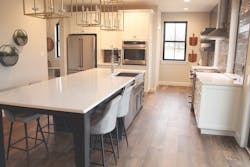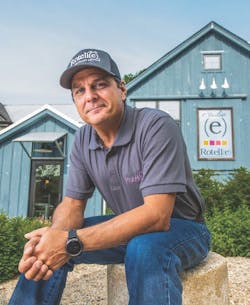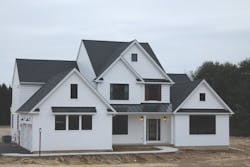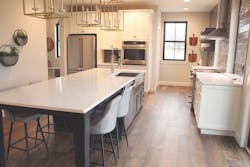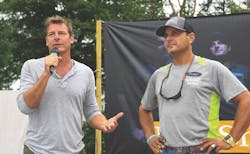Marketing 101: Be the Expert
A key idea driving the work of Rotelle Development Co. and Rotell(e) Studio(e) is that people need not be millionaires to have a custom home built by the South Coventry, Pa., company. Owner and CEO Peter Rotelle’s team has launched several brand-building outreach efforts by positioning the company as a resource and one-stop shop for land-buying consultation, financing, design, and construction of custom homes in the $600,000 to $800,000 range.
One of the builder’s bigger marketing splashes was the H(e) vs. Sh(e) Shed Shindig, a competition in 2018 that pitted the company’s male against female employees in design teams tasked with putting a creative spin on creating a backyard refuge out of a 12-by-12-foot garden storage shed. Facebook videos chronicled both teams’ progress and a local radio station promoted pre-balloting previews, all of which culminated in a day-of streamed event and charity fundraiser hosted by Ty Pennington of television’s Trading Spaces and Extreme Makeover: Home Edition.
That was a home run of a marketing campaign, which succeeded as a branding event to get the company’s name out there and was followed up later by creating opportunities to show off the company’s other attributes. In the two years since the Shindig, Rotell(e) has taken smaller steps to build awareness of the range of services the company provides, all under the umbrella of building a bespoke home at a fraction of the cost of a $1 million custom house.
Cultivating the "Enemy"
One way Rotelle did this was by presenting his company as an expert resource through outreach events, such as hosting lunch-and-learn gatherings with real estate agents. Yes, real estate agents. Typically, when custom home builders try to increase their pipeline of prospects, they seek architects for referrals. Builders that have their own sales teams, as Rotell(e) does, may deem recruiting real estate agents as being akin to sleeping with the enemy. But for Rotell(e), real estate agents generate almost half of the company’s clients and, compared with leads from social media, the web, and drive-up traffic, most of those prospects are already qualified for financing. As for the in-house sales team, Rotelle hires salespeople from other industries, not real estate, who can learn the company’s processes and systems from training manuals and are able to present the Rotell(e) homebuying experience clearly to prospects.
“I don’t look at our sales team as sellers,” Rotelle says. “I think they’re more like educators. There are five, six ... seven stops on the purchasing train line, and all we do is educate you on those five to seven and help you get through those. Someone may come in and rip through all of the steps in a month and sign a contract, while another couple comes in, gets one step done, comes back six months later to do another step, and two years later they’re ready to sign. It’s a lot of planting seeds, and we’re a research center. If we’re doing our job properly, it’s not really a sale.”
Rotell(e) Studio(e) offers complete turnkey services for building custom homes and house plans, like the multigenerational Augusta-Cape Cod.
With real estate agents, Rotell(e) leveraged one element of its turnkey services by explaining how the proprietary Lot Scrub process can benefit the agents’ clients. Engineers and construction experts from Rotelle Development, the business’ land development arm, evaluate environmental and zoning issues to determine if a plot is suitable for building, and if it is, estimate the cost of site improvements.
“Realtors understand housing, that’s their business. But when it comes to land, it’s something they may need assistance with,” Rotelle says. “We do lunch and learns so Realtors can understand what we do. A lot of times, the Realtor may have a listing or the potential of getting a listing on a piece of land and they’ll bring it over to us to ask if we can help them out. So, in turn, it’s a referral for us. Since we helped them, they think of us when they have a client, and they know we’re a resource. Over the past five to seven years, our real estate penetration has been really excellent.”
Going on Tour During the Pandemic
Other direct-to-consumer outreach that complements print and social media includes efforts such as the handful of Meet the Builder tours Rotell(e) has done. The most recent tour was held last October, during the pandemic, in a boutique community where Rotelle Development owns 10 lots and had seven projects at various stages of construction. The tours were promoted through print advertising and social media. Prospects received masks and hand sanitizer as they checked in at a registration table outdoors, then Rotelle and three project managers made sure attendees were socially distanced by spreading out the tours through the homes. Generally, homebuyers are more interested in the finishes and looking at eye candy items such as counters and cabinets, but Rotelle contends that showing prospects what’s behind the walls does have value, plus, prospects are reassured by seeing that the company owner will be involved in their project.
“While we don’t get into the minutiae because people only have enough bandwidth to listen, people are thirsty for education and more understanding,” Rotelle says. “You [show them] that the wiring in our houses doesn’t look like a rat’s nest and that when the A-frame comes up to the top and touches the ridge board the cuts are so perfect you can’t slip a credit card in there. What does all this mean to them? It means you have a quality, well-built home that’s going to require less maintenance. It’s going to last longer, and once your warranty expires, you’re not going to incur a litany of expenses.”
Design studio events, such as The House of Joy, help position chief designer Renée Pratt and chief design consultant Heather Ryan as experts available to review visitors’ custom home ideas and plans for interiors and landscaping. Rotell(e) has coupled such gatherings with presentations by a KonMari consultant about decluttering, organizing, and mastering the KonMari folding technique and sessions by a feng shui expert on how a floor plan can complement concepts of energy and flow.
The origin of Rotell(e)’s marketing strategy perhaps was the realization that consumers didn’t know what the company does. So the builder started with branding and building awareness. With the baby steps that followed, the company has built decent traffic on social media, its website, and with visits to the design studio. Now Rotelle has an elevator pitch: “We have all aspects of custom home building tied together with a red bow and streamlined to make it an enjoyable process for the client, where all of the heavy lifting is done in the background by us,” he says.
Ty Pennington and Peter Rotelle hosting the H(e) vs Sh(e) Shed Shindig event.
Landing Pennington
How did Peter Rotelle land carpenter and TV host Ty Pennington for the H(e) vs. Sh(e) Shed Shindig? Three degrees of separation. Rotelle was able to talk a friend of a friend into arranging a 5-minute phone call with Pennington. That conversation turned into 20 minutes, and by the end of it Pennington was on board for the Shindig, a concept originally pitched by Rotell(e) Studio(e)’s chief designer Renée Pratt when the team was brainstorming ideas for events that would help to build the company’s brand.
The next event in the works will involve the H(e) Shed built for the Shindig. It’s a TV show about glamping at a nearby campground in Amish country and could possibly include Pennington. “We’re going to do 30 different, really neat glamping sites,” Rotelle says. “It’s going to be super cool.”
